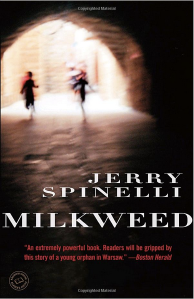This is one of the most beautiful books I have ever read.
 Published in: 2003
Published in: 2003
Pages: 208
The protagonist: Misha Pilsudski, a probably-around-seven Gypsy boy in Warsaw, Poland before, during and immediately after the Nazi invasion. Misha has no family and no recollection of one other than the band of Gypsy boys he survives with. Misha is small and quick and very proud of his ability to snatch food and evade capture.
The gist in 100 words or less: This is the story of the Polish Jews in Warsaw, from invasion to deportation, told by a young child with no loved ones, no frame of reference and no worldly experience whatsoever. It is stunning, heartbreaking, beautiful, inspiring and devastating.
Great stuff: The writing the writing the writing. The story–the invasion of Warsaw by the Nazis, the formation of the famous ghetto, the description of life within it, and the escalation of horrors until the trains come for the deportation, presumably to Treblinka–is shown through the eyes of a young boy who has absolutely no idea, and no context for, this genocide. He wonders if the Nazi invasion might be a parade. He joyfully follows his new Jewish friends as they file into the ghetto, awaiting the wonders that lie behind the wall. And later, he believes that the trains might be coming to take the ghetto occupants to a new village where they can reside in peace.
Meh: Nothing. Obviously it’s not a happy story, and some people (myself included) hesitate to pick up stories like this because of the imminent sadness. I strongly encourage you not to do that in this case.
Best quote: “Gunshots echoed in the streets as Mr. Milgrom said words over the candle flame. The flame gave a faint yellow tint to his frozen breath. Then he sang a song. ‘Sing, Janina,’ he said, but Janina only gave a grunt or two. Then he pulled Janina and me to our feet, and the twins also, and he made us all hold hands and we danced in a circle while Mr. Milgrom sang and the candle flame quivered and somebody screamed in the night.”
Parent/teacher alert: This is serious, serious, crucial, sobering stuff. Have conversations. Recommend other titles. Look up answers to questions. Give hugs.
Read it if you liked: Number the Stars, Stolen Years (looks to be out of print but it is the Holocaust book that stands out most from my childhood), Night, anything else by Jerry Spinelli because he’s amazing.
Not good for: I am from the school of everyone-should-read-this-book-and-books-like-it. I do have students with major mental health struggles/PTSD surrounding death and abuse, and I think they would be the only ones I would recommend/support not picking it up until they are in a better mental place to do so.
What my students think: My literacy class, which is comprised of struggling readers, was absolutely riveted to this story. Misha’s perspective is so limited that it required lots of context-clue prompting and discussion about what exactly he was seeing, but they were enthralled nonetheless.
